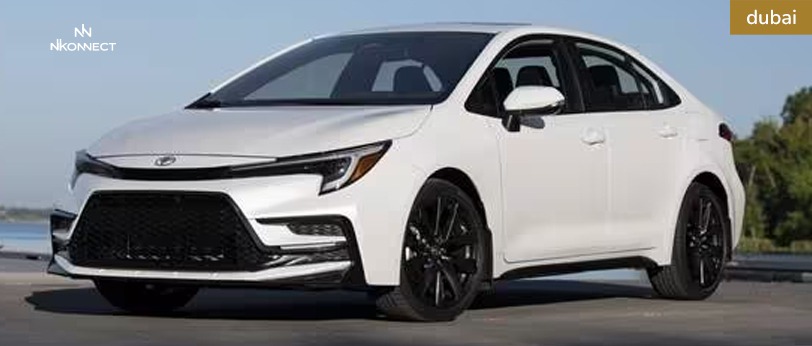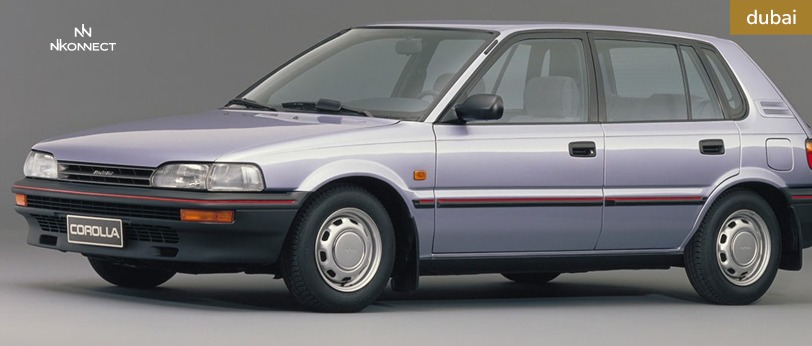Exploring the Toyota Corolla: Legacy, Evolution, and Impact on the Automotive Industry
CARWORLDUAEDUBAIBUSINESSAUTOMATIVE


The Toyota Corolla, a name synonymous with reliable sedans, has evolved beyond its traditional image to offer a range of exciting models. Initially conceived as a subcompact sedan, the Corolla now includes liftbacks, hatchbacks, fastbacks, coupe versions, an MPV variant, and a recent crossover edition. Enthusiasts fondly reminisce about the Corolla's performance-oriented past, including TRD derivatives in the late seventies and iconic models like the 16-valve Twincam GLi Corollas and RSi Conquests in the late eighties and nineties. These models, especially the RSi variants with engines from the renowned 4A-GE family, earned a reputation as formidable competitors on both streets and racing circuits.
Despite a hiatus in high-performance models due to emissions control measures leading to the discontinuation of the 4A-GE engine in the early 2000s, Toyota has rekindled excitement with the launch of the Corolla GR model. Joining the esteemed Toyota Gazoo Racing family, the GR Corolla boasts a turbocharged petrol engine, all-wheel drive, enhanced suspension, and distinctive styling. Built on the acclaimed TNGA-C platform, the GR Corolla delivers impressive power, with a turbocharged 1.6-liter engine generating 221kW and 360Nm, accelerating from 0-100km/h in just 5.2 seconds. This model pays homage to the Corolla's racing heritage while embodying Toyota's commitment to performance-driven vehicles.
The Corolla's legacy spans over 55 years, with more than 50 million units sold globally. From its inception as a subcompact sedan to embracing new technologies and diverse models, the Corolla continues to resonate with consumers worldwide. Its evolution includes iconic models like the AE86 Levin coupe and the versatile E70 range, showcasing Toyota's ability to adapt and innovate. The latest generations feature hybrid and turbo powertrains, catering to modern preferences, with the recent GR version highlighting Toyota's dedication to producing thrilling driving experiences across its lineup.


The Toyota Corolla stands as a testament to Toyota's commitment to producing reliable and innovative vehicles. With a rich history spanning over five decades, the Corolla has evolved from a humble subcompact sedan to a global automotive icon, leaving an indelible mark on the automotive industry.
Origins and Early Years The Corolla made its debut in 1966, designed as a compact and fuel-efficient sedan. Its name, derived from the Latin word for "small crown," reflected Toyota's ambition to create a vehicle that would reign supreme in its segment. From the outset, the Corolla embodied Toyota's ethos of quality, durability, and reliability, quickly gaining popularity among consumers.
Global Success and Expansion By the early 1970s, the Corolla had become a global phenomenon, recognized for its affordability, fuel efficiency, and practicality. It surpassed the Volkswagen Beetle to become the world's best-selling car by 1974, solidifying its position as a household name. Toyota expanded the Corolla lineup to include diverse body styles such as hatchbacks, wagons, and coupes, catering to varying consumer preferences across different markets.
Technological Advancements and Innovation Throughout its history, the Corolla has been at the forefront of technological advancements. Toyota introduced features like MacPherson strut front suspension, five main bearing engines, and in-house-developed shock absorbers in early models. The Corolla also played a pivotal role in Japan's motorization era of the 1960s, symbolizing progress and accessibility for consumers.
Performance Heritage and Motorsport Success Beyond its reputation as a reliable commuter car, the Corolla has a rich motorsport heritage. Models like the AE86 Levin coupe, known as the "Hachi Roku," gained legendary status for their rear-wheel-drive layout and agile handling. Racing versions of the Corolla, including the RSi and TRD variants, showcased Toyota's engineering prowess on the track, winning championships and accolades.
Modern Era and Global Presence In recent years, the Corolla has continued to evolve to meet contemporary demands. Hybrid powertrains, advanced safety features, and cutting-edge technology have become standard offerings, reflecting Toyota's commitment to sustainability and innovation. The Corolla's global presence remains strong, with sales spanning over 150 countries and contributing significantly to Toyota's global success.
The Future of the Corolla As automotive trends shift towards electrification and autonomous driving, the Corolla remains at the forefront of Toyota's vision for the future. The introduction of hybrid and electric variants underscores Toyota's commitment to eco-friendly mobility solutions. The Corolla's enduring legacy as a reliable, efficient, and versatile vehicle ensures its continued relevance in the ever-evolving automotive landscape.
When was the Toyota Corolla first introduced?
The Toyota Corolla was first introduced in 1966.
What does the name "Corolla" mean?
The name "Corolla" is derived from the Latin word for "small crown."
How many generations of the Toyota Corolla have been produced?
The Toyota Corolla has been produced in 12 generations.
What is the Toyota Corolla known for?
The Toyota Corolla is known for its reliability, fuel efficiency, and practicality.
What is the best-selling car worldwide by 1974?
The Toyota Corolla became the best-selling car worldwide by 1974.
What body styles are available in the Toyota Corolla lineup?
The Toyota Corolla lineup includes sedan, hatchback, and wagon body styles.
What technological advancements did early models of the Corolla introduce?
Early models of the Corolla introduced features like MacPherson strut front suspension and in-house-developed shock absorbers.
What is the motorsport heritage of the Toyota Corolla?
The Toyota Corolla has a motorsport heritage with models like the AE86 Levin coupe gaining legendary status for their rear-wheel-drive layout and agile handling.
What are some notable variants of the Toyota Corolla in motorsport?
Some notable variants of the Toyota Corolla in motorsport include the AE86 Levin coupe and racing versions like the RSi and TRD variants.
How has the Toyota Corolla evolved to meet contemporary demands?
The Toyota Corolla has evolved by introducing hybrid powertrains, advanced safety features, and cutting-edge technology.
What is Toyota's vision for the future of the Corolla?
Toyota's vision for the future of the Corolla includes introducing hybrid and electric variants to promote eco-friendly mobility solutions.
How many countries is the Toyota Corolla sold in?
The Toyota Corolla is sold in over 150 countries worldwide.
What percentage of Toyota's global sales does the Corolla family account for?
The Corolla family accounts for about 20% of Toyota's global sales.
What is the motorsport nickname for the AE86 Corolla?
The AE86 Corolla is nicknamed the "Hachi Roku" in motorsport circles.
What is the significance of the Corolla in Japan's motorization era?
The Corolla played a vital role in Japan's motorization era, symbolizing progress and accessibility for consumers.
How has the Corolla contributed to Toyota's global success?
The Corolla's popularity and sales success have contributed significantly to Toyota's global success and reputation.
What is the top speed of the GR Corolla?
The GR Corolla has a (limited) top speed of 250 km/h.
What are some key features of the GR Corolla?
The GR Corolla features a turbocharged petrol engine, all-wheel drive, wider track front and rear, and advanced safety systems.
How many cars are built every hour in the Corolla family's history?
About 100 cars have been built every hour throughout the Corolla family's history.
What is the Corolla's enduring legacy in the automotive industry?
The Corolla's enduring legacy lies in its reputation for reliability, efficiency, and versatility, ensuring its continued relevance in the automotive industry.


